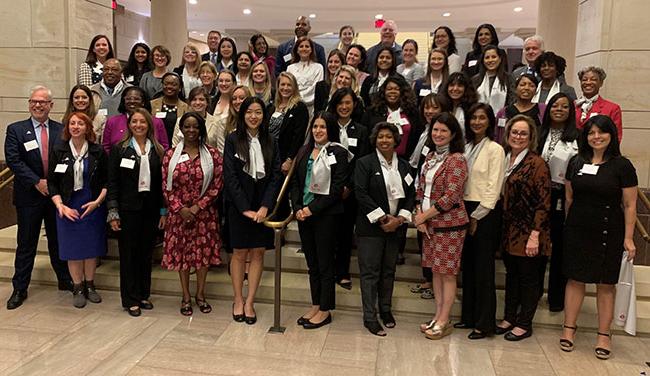More than 60 women and men gathered on Capitol Hill in Washington, DC, on 7 October for the SheLeadsTech program’s second annual Day of Advocacy. Featuring presentations on issues facing the tech workforce and women in the field, plus congressional visits, the Day of Advocacy allowed SheLeadsTech professionals to connect their own experiences with policy and expand their networks. ISACA also launched its “Tech Workforce 2020: The Age and Gender Perception Gap” study at the event.
The mission of SheLeadsTech is to increase the representation of women in technology leadership roles and the tech workforce through raising awareness, preparing to lead, and building global alliances. In addition to visiting 19 congressional offices representing nine states and the District of Columbia, SheLeadsTech professionals met with staff from the House Committee on Science, Space and Technology (Subcommittee on Science and Technology) and the Senate Committee on Commerce, Science and Transportation (Subcommittee on Communications, Technology, Innovation and Internet). The SheLeadsTech delegates were able to share their experiences with members of Congress to bring to life the issues that women face in the technology workforce as well as discuss three proposed pieces of legislation: the Building Blocks of STEM Act, the 21st Century STEM for Girls and Underrepresented Minorities Act and the Cyber Ready Workforce Act.
- The Building Blocks of STEM Act (S. 737, H.R. 1665) would create and expand upon science, technology, engineering, and mathematics (STEM) education initiatives at the National Science Foundation (NSF) for young children, including new research grants to increase the participation of girls in computer science.
- The 21st Century STEM for Girls and Underrepresented Minorities Act (H.R. 1591, S. 1299) would empower school districts to better engage girls, young women and minority students in the STEM fields. It would also provide funding for local school districts to create the necessary infrastructure for enhanced STEM learning early in a student’s academic career.
- The Cyber Ready Workforce Act (S. 1466, H.R. 2721) would establish a grant program within the Department of Labor where grants will be awarded on a competitive basis to workforce intermediaries to support the creation, implementation and expansion of registered apprenticeship programs in cybersecurity.
Staff from the House Committee on Science, Space and Technology noted that constituents sending letters of support for legislation is critical for Congress to understand the grassroots interests and individual perspectives from professionals in the tech field.

ISACA released its “Tech Workforce 2020: The Age and Gender Perception Gap” research in conjunction with the SheLeadsTech Day of Advocacy. The study found that women professionals in IT often feel stuck in their current positions and are unsure of what steps can be taken to advance their careers; they believe that more women in the tech workforce will allow for more role models and mentors. Additionally, the report found that 49 percent of women say their employers have no programs that focus on recruiting more women into tech roles.
One SheLeadsTech delegate from the Washington, DC, area, noted that she is the highest-level woman in her company “and shouldn’t be,” as she has been in the field for a decade and is in middle-management. “No one ahead of me is tackling diversity and inclusion.”
ISACA CEO David Samuelson visited US Sen. Dick Durbin’s office as well as the House Committee on Science, Space and Technology, and joined delegates from Washington, DC, as they visited their representative. He explained that the SheLeadsTech program has been a grassroots movement from ISACA’s global membership and is leading the drive for more leaders in the technology workforce. “The cybersecurity battlefield needs diversity of thought to actually win,” he said. “It requires differing skill sets, amplified skill sets. We won’t win without women.”
Visiting the Hill, attending the morning keynote and panel sessions, and being able to network with other SheLeadsTech participants allowed for women and men to engage with policy and personal career goals. “This was such a unique experience,” said attendee Jeanette Snook, cybersecurity analyst for Visa, Inc. “I’ve lived [in the DC area] for years and have never visited my members of Congress to discuss issues. I want to make a difference and take it back with me to my role and for others.”
